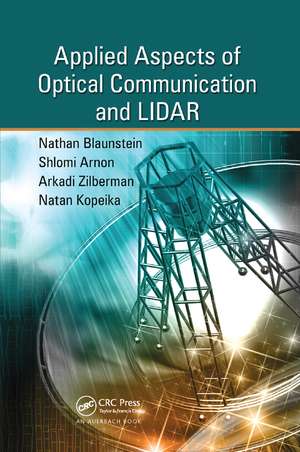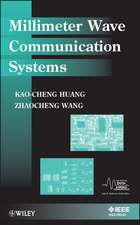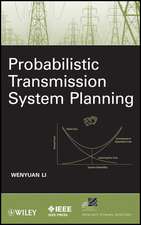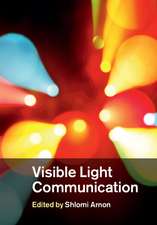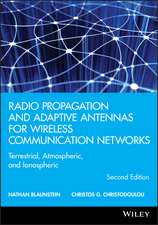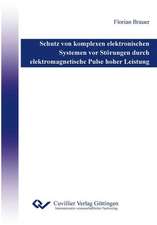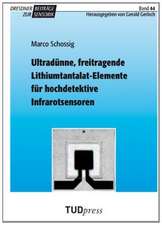Applied Aspects of Optical Communication and LIDAR
Autor Nathan Blaunstein, Shlomi Arnon, Natan Kopeika, Arkadi Zilbermanen Limba Engleză Paperback – 19 sep 2019
Bridging the gap between the parameters of optical communication links and signal information data streams, this concise reference addresses line-of-sight (LOS) as well as obstructive non-line-of-sight (NLOS) propagation conditions. It also:
- Details the main characteristics of optical communication channels
- Introduces the quasi-regular gaseous atmosphere
- Describes numerous situations in the atmospheric communication channel
- Explains the main characteristics of optical communication channels
Complete with parameters for information data streams, the text also provides time-saving suggestions for determining which optical devices will work best for minimizing the deleterious effects of natural atmospheric phenomena. Whether you’re a researcher, an engineer, or student—this book provides you with the practical understanding required to use LIDAR to investigate all forms of atmospheric phenomena and to learn how to accurately predict primary parameters of atmospheric optical channels.
| Toate formatele și edițiile | Preț | Express |
|---|---|---|
| Paperback (1) | 446.19 lei 6-8 săpt. | |
| CRC Press – 19 sep 2019 | 446.19 lei 6-8 săpt. | |
| Hardback (1) | 904.63 lei 6-8 săpt. | |
| CRC Press – 28 dec 2009 | 904.63 lei 6-8 săpt. |
Preț: 446.19 lei
Preț vechi: 524.93 lei
-15% Nou
Puncte Express: 669
Preț estimativ în valută:
85.41€ • 92.80$ • 71.79£
85.41€ • 92.80$ • 71.79£
Carte tipărită la comandă
Livrare economică 21 aprilie-05 mai
Preluare comenzi: 021 569.72.76
Specificații
ISBN-13: 9780367384579
ISBN-10: 0367384574
Pagini: 280
Dimensiuni: 156 x 234 x 15 mm
Greutate: 0.52 kg
Ediția:1
Editura: CRC Press
Colecția Auerbach Publications
ISBN-10: 0367384574
Pagini: 280
Dimensiuni: 156 x 234 x 15 mm
Greutate: 0.52 kg
Ediția:1
Editura: CRC Press
Colecția Auerbach Publications
Public țintă
Academic and Professional Practice & DevelopmentCuprins
Atmosphere: Structure and Processes. Vertical Profiles of Temperature, Pressure, and Number Density. Aerosols. Hydrometeors. Atmospheric Turbulence. Optical Wave Propagation in the AtmosphereRefraction Phenomena. Effects of Aerosols. Aerosol Effects on Optical Wave Propagation. Effects of Hydrometeors. Effects of Atmospheric Turbulence on OpticalPropagation. Measurements of Atmospheric Turbulence. Modeling of Atmospheric Optical Turbulence. Line-of-Sight Bending Caused by Strong. Atmospheric Turbulence. Applied Aspects of LIDAR. Turbulence Profile Measurement with LIDAR. Lidar Research of Passive Scalar Field Fluctuations. Lidar Measurement of Atmospheric Aerosol Parameters. Optical Communication Channels. Main Characteristics. Key Parameters Prediction. Mathematical and Statistical Description. Modulation Methods. Channel and Signal Data Parameters in Atmospheric Optical Communication Links. Irradiance PDF. Key Parameters of Data Stream in Optical. Channels with Fading. Modeling of Key Parameters of the Channel and Information Data. Summary. Abbreviations. Index. Each chapter concludes with a "References" section.
Notă biografică
Blaunstein, Nathan; Arnon, Shlomi; Kopeika, Natan; Zilberman, Arkadi
Descriere
Exploring the practical aspects of atmospheric optical communication and light detection and ranging (LIDAR), Applied Aspects of Optical Communication and LIDAR details the role of atmospheric structures in propagation phenomena that influence the transmission of optical signals through perturbed atmospheric communication channels. It examines numerous situations in over-the-terrain atmospheric communication channels, including the effects of natural phenomena and the corresponding features (turbulences and hydrometeors) on optical ray propagation. This concise reference addresses line-of-sight (LOS) as well as obstructive non-line-of-sight (NLOS) propagation conditions.
